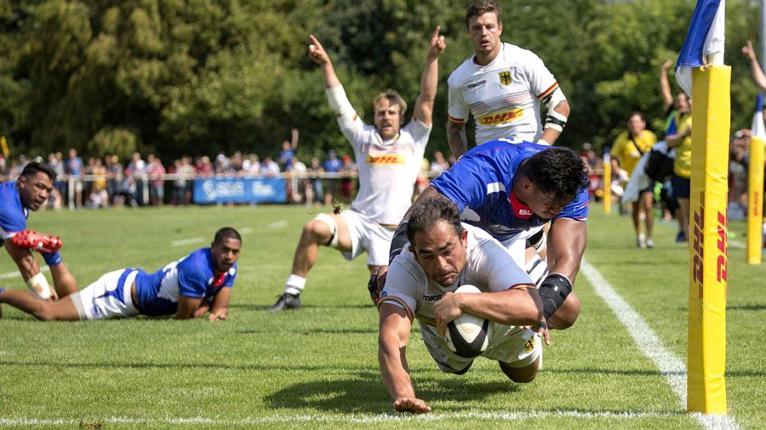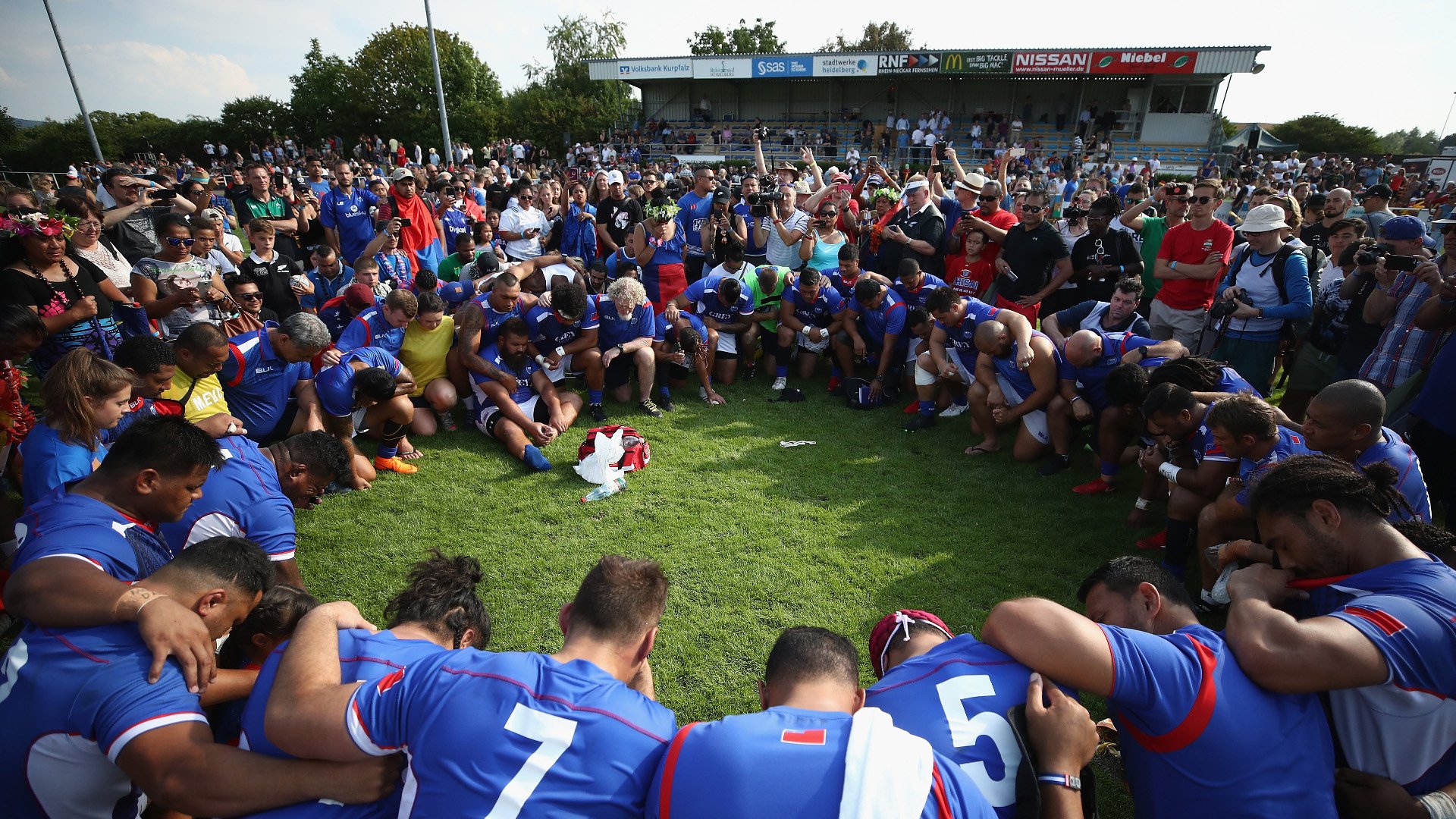A billionaire, the awful 'unknown' and a battle for a sport's very survival

Few people gave Germany a chance ahead of their 2019 Rugby World Cup play-off second leg against Samoa on Saturday. But in Heidelberg, the collective will of the players, coaching staff and fans almost produced the biggest result of the country’s rugby history.
In a battle between two teams that have had their fair share of off-the-field issues to deal with of late, Samoa had taken a decisive step towards Japan with a 66-15 win in the opening encounter in Apia.
On arrival at the sun-baked Fritz-Grunebaum-Sportpark, though, it was impossible not to appreciate the sense of community. It pervaded from the makeshift gazebos selling rugby equipment, to the stands cooking up grilled meat and dishing out cold beer, to the fans taking their seats in hope rather than expectation.
This was a day for German rugby to display its unity following a turbulent season. The impasse between the German Rugby Federation (DRV) and Dr. Hans-Peter Wild, the Stade Francais owner born a leisurely bike ride away from the game’s venue, had first resulted in a player strike at the end of last year and ultimately ended with the businessman walking away completely last month.
Dr Wild had set up his Wild Academy more than a decade ago to produce the players that could help the national team qualify for the World Cup. In June – less than 10 days before the crucial play-off against Portugal – he withdrew his funding, plunging the majority of the German squad and coaching staff into imminent unemployment.

Samoa’s visit represented a chance for the rugby community to show that the sport would survive. Having been switched from the 13,500-capacity Brit-Arena in Wiesbaden at late notice due to security issues, and despite an outmoded booking system, all 2,500 tickets released on advance sale had been snapped up.
A healthy Samoan support – Germany’s Pacific Island diaspora boosted by fans travelling to Heidelberg from Dublin and London – had helped swell the attendance by at least another 1,000 on match day.
Moreover, the draw of watching their national side test itself against an established World Cup side proved too attractive for many local fans to turn down.
“Essentially Germany is a really sport-mad country and they wanna see their teams perform at the highest level,” home lock Luke Dyckhoff said. “The bigger the team we play, the more amazing the atmosphere.”
Continue reading below…
The DRV’s new president, Robin Stalker, was also in attendance for the first time – having been sworn in only six days previously – and fans arrived sporting the full variety of colours from the country’s top two leagues.
Stalker would not be the most high profile spectator in this unheralded corner of Heidelberg, however. Dr Wild had branded the DRV amateurish during an interview last month, but hints that he might have a change of heart were hard to ignore.
Capri-Sun branding (Wild owns the drinks brand) absent for Germany’s previous home game at this stadium was back on show, while former Germany international and Stade Francais sporting director, Robert Mohr, mingled with players and staff he once worked alongside at the academy’s base over the road.
It had been intimated ahead of the Portugal game that Dr Wild would have received a hot reception had he shown his face last month.
On Saturday, he arrived close to kick-off and kept a low profile as the match ensued. The only outward evidence that he was there at all coming – bar a giant inflatable Capri-Sun carton on one touchline – from a banner unfurled in the second half by Heidelberger RK fans in support of their former benefactor.
Fans unveil a ‘Thank You Dr. Wild’ banner in front of a giant inflatable Capri-Sun carton.
Excellent product placement. pic.twitter.com/KUS8EwWC2n
— Martyn Thomas (@MCThomasSport) July 14, 2018
Not everyone involved in German rugby shares that sentiment. His decision to divert funds from Heidelberg to Paris coming at a time when they were needed it most.
The DRV – an organisation which relies on the hard work of dedicated volunteers to function at all – struggled to find the cash needed to fulfil the two legs of this qualifier. Dr Wild has agreed to honour all academy contracts until September, but the uncertainty has cast a cloud over the national team’s preparations.
Samoa’s players would certainly be able to empathise given their own continued struggles, but they were not in charitable mood in Apia a fortnight ago as they ran in 10 tries.
Germany made their protracted return from the southern hemisphere determined to make up for their defensive shortcomings.
“We decided as a group that we wanted to show what we are all about, and show some character,” Germany second-row Timo Vollenkemper said afterwards. “We didn’t really care about the result, just to come off the pitch with our heads held high and perform like we can do, and should have done before.”
However, as Ed Fidow touched down for the game’s first try within a minute of kick-off it looked like bravado at best.
But this team has become closer in adversity and wrestled back control of the contest almost immediately. Tries from Jaco Otto, his third of the tie, and Samy Fuchsel allied to a Chris Hilsenbeck penalty on the stroke of half-time remarkably gave Germany a 15-14 lead at the break.

It was not a score that flattered the home team either, and as EDM belted out over the stadium tannoy the crowd allowed itself an opportunity to dream once more. Qualification into Pool A might have disappeared in Apia but the hosts were proving themselves worthy of this level.
Samoa, by contrast, looked as though their prime minister’s harsh words were still ringing in their ears. The visitors’ lineout failed to function from the first minute, while simple handling errors in midfield were proving costly.

When Marcel Coetzee stepped up to send a penalty from just inside his own half bobbing, in virtual slow-motion, over the crossbar with less than 15 minutes remaining a place in the history books was up for grabs. The home fans could barely believe it, every catch, mark, pass and kick from a player in white was cheered raucously.
Unfortunately, crowd support is not always enough to see a team over the line, and so it proved. Ah See Tuala, twice, and Fidow stepped up to deliver three tries in the final 11 minutes – two of which came in the last 180 seconds – to deny their hosts a victory that would live long in the memory.
As referee Matthew Carley’s whistle confirmed a 42-28 victory for Samoa, the mood in Heidelberg remained upbeat. While the visitors, and their fans, celebrated their World Cup qualification the home side huddled yards away, regaining focus on the challenge to come in November.
Samoa run in three late tries to deny Germany a famous victory in Heidelberg and rubber stamp their ticket to #RWC2019
@DRVRugby 28-42 @manusamoa pic.twitter.com/KPQ6agHsJ5
— Martyn Thomas (@MCThomasSport) July 14, 2018
Canada, Hong Kong and the 2018 Africa Gold Cup runner-up stand between Germany and a place in Pool B in Japan. No one who was there on Saturday would bet against them making it.
Replacement lock Dyckhoff was left to reflect on the roller coaster nature of the sport. “You’re always guaranteed a down after an up and then when you’re down there’s always going to be an up,” he said.
“So, it’s best just to play every game like it’s your last with the guys you’ve worked so hard with and that’s what the guys were focusing on so hard this week.
“Just putting that (uncertainty) aside, because it is hard, it has affected people mentally, as it would any human being. That unknown is awful.
“But as the guys showed (on Saturday), they’re great friends and they’re great rugby players.”

















































